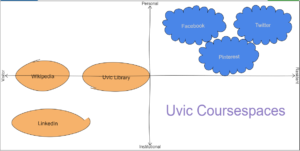
Digital Visitors and Residents Mapping
(create your own DV & R here)
The internet did not only connect people but it also offered a different way for learners to learn and for professionals to establish their professional identity. For instance, different digital platforms like MeetUp, LinkedIn, Slack, Quora, and etc. are used by the students and professionals to develop their professional network. Among the digital platforms mentioned, it is LinkedIN that I am very much familiar with. One of the reasons that I created LinkedIn is because I wanted to have an idea on how I can manage my “professional brand” in the future. One good thing about LinkedIn is that it can help me connect with different companies regardless of where they are in the world. More so, because I could also be connected to different companies abroad, I feel like my chances and opportunities to get hired in a good company is boundless. Lastly, using LinkedIn can also be very convenient given the pandemic. Of course if companies would need employees to fill-in certain positions, they would opt to do the application process online and use digital platforms like LinkedIn.
As a student, I believe that expanding one’s professional network is not only limited to using MeetUp, LinkedIn, Slack, and such. This is because social media platforms like Facebook and Twitter can also be used by students to connect with professional individuals and different companies. In addition to this, Facebook and Twitter can also enable its users to increase the discoverability of their professional profile online. Nevertheless, when students use Facebook or Twitter for professional reasons, they need to be careful in following or adding people or group. There are a lot of dummy accounts in Twitter and Facebook and this dummy account can be used by someone pretending to be a head hunter or a recruiter. To reduce or avoid the possibility of getting scammed, students need to be vigilant.
Currently, I am also using Twitter to establish my professional identity online. In creating my digital identity, I make it sure that I do not follow Twitter users who are not using their real names, my favorites and retweets have decent contents, and I use formal language when posting something. It is important to do all these steps because if ever I will apply in a local company, I want my Twitter account to convince my local employer that I am a decent person and I am also qualified to do the job. If I posted rants or inappropriate memes, there is a huge possibility that the local employer will not call me for interview. Just as mentioned in the previous lessons, there are some employers who use the applicant’s digital footprints to identify if they should call the applicant or not. In this case, my digital footprints should therefore tell my future employers that I am the best person for the job.
michellebannister says:
Hi!
I have never considered not following people who do not use their real names! Thank you, that is great insight, as you never know who that person might actually be behind the screen. I think it is great to always be cautious while online about what you post as you never know where life might take you and having a negative social media trail to try and clean up is almost impossible.
February 6, 2021 — 3:12 pm